Services
Pet Wellness Services
Puppy and Kitten Care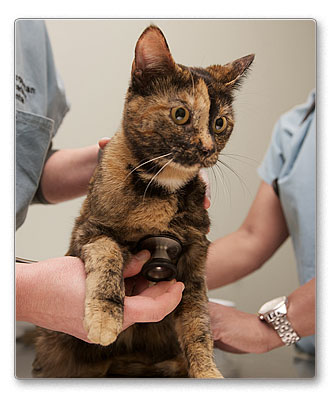
There is nothing more exciting than bringing home a new puppy or kitten. New pets add energy and fun, and are a source of unceasing affection as they bond with you and your family.
However, they also require a little extra attention to ensure they get a healthy start at life. Comprehensive physical exams at developmental stages are important. If you're new to having a pet, a little time- and veterinarian-tested advice on housebreaking and training might be needed as well.
Your very first visit with us is perhaps the most important. These initial visits are when client, doctor and animal first meet and begin to form the relationship that will last for your pet's lifetime. We like to take our time with these visits to give your puppy or kitten a thorough exam, talk with you about concerns you may have, offer health care and training advice, and more.
Your kitten's first visit will include:
- Diet discussion, including types of food that are best for cats' unique requirements.
- Litter and litter box discussion
- Behavior discussion
- Spaying and neutering discussion
- Declawing—Should I or shouldn't I?
- Vaccine protocol. (Additional fees may apply to each vaccine.)
- Discussion of pet health insurance. Should I get pet health insurance? What should I look for in a company?
- Microchipping for cats going outdoors. Should I get this done? When is the best time to do this? (An additional fee applies for microchip placement.)
- Fecal exam for worms and other intestinal parasites (An additional fee applies.)
- Testing for Feline Leukemia Virus (FeLV) and Feline Immunodeficiency Virus (FIV) (An additional fee applies.)
- Complete physical exam which includes detection of potential congenital problems.
Your puppy's first visit will include:
- Diet discussion, including types of food to feed, balancing the diet for clients opting to feed raw or home-prepared diets, and guidelines on feeding intervals and quantities
- Housetraining discussion
- Behavior discussion
- Spaying and neutering advice—Is this best for my dog? What are the consequences of spaying/neutering too early and what should I expect if I don't want to spay or neuter my dog? If I decide to spay/neuter, when is the best time to have this done?
- Formulation of a minimal, individualized vaccine protocol.
- Discussion on pet health insurance. Should I get pet health insurance? What should I look for in a company?
- Microchipping. Should I get this done? When is the best time to do this?
- Fecal exam for worms and other intestinal parasites (An additional fee applies.)
- Complete physical exam which includes detection of potential congenital problems and anything else you may want to discuss. This is your new pet and we're happy to answer any questions.
Vaccinations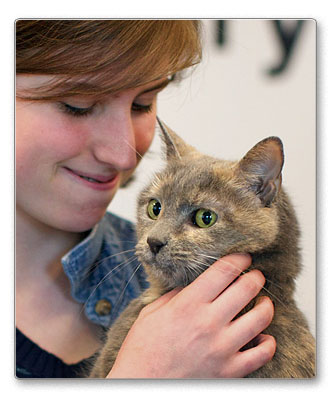
Immunizations are one of the best tools we have available in preventive medicine. The key to using vaccines appropriately is to determine which diseases each particular pet may be at risk for, then vaccinate for those diseases no more than necessary.
We believe that our balanced approach to vaccines is the best way to protect your pet from disease and minimize the risk of an adverse reaction to a vaccine.
We provide core vaccines for puppies, such as Distemper, Bordetella, and Leptospirosis, and for cats the FVRCP vaccines and FeLV. We'll be happy to explain when we feel these vaccines ought to be administered, and what vaccines you should consider once your pet—whether dog or cat—becomes an adult.
Annual Wellness Exams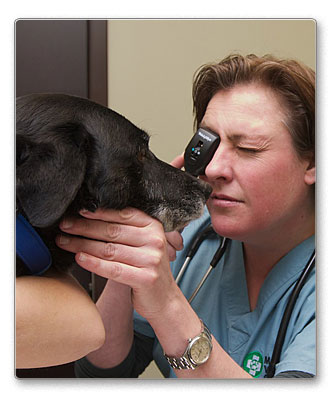
Prevention is the key to your pet's long term health. It is also an important factor in minimizing the lifetime cost of care. We recommend a regimen of routine wellness exams, vaccinations, lab work, deworming and fecal checks to keep your pet in optimum health. We can also prescribe medications to prevent heartworm, fleas and ticks.
Most of these tests can be done during your dog or cat's regular exam. These visits are a chance to assess your pet's overall health, discuss any changes we see, educate and update you on advancements in veterinary care, and for you to discuss any concerns or questions you may have.
Our wellness exams include:
- Examining the heart and lungs
- Checking the teeth and oral cavity
- Assessing vision, eyes, and ears
- Palpating lymph nodes, abdomen and examining the skin
- Palpating joints and muscles
Routine Blood Work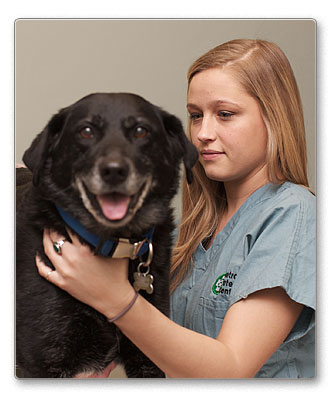
A complete physical should include a full blood workup. Not only can a full chemistry panel and complete blood count identify the presence of underlying disease processes, these tests can help create a baseline should your pet become ill between routine examinations. Blood work is also necessary if we recommend a dental cleaning, removal of a skin mass, or any other procedure that requires anesthesia. We recommend complete blood testing annually for all pets over the age of seven.
Preventive Medications
Since fleas and ticks are prevalent in our area of the country, we recommend that your pet receive preventive medication for these pests. We offer a variety of preventives and would be happy to help you determine which is best for your companion.
Dangerous parasites are also present in almost any environment. If brought into your home, these parasites can be passed from your pet to you and your family. We normally associate parasites, such as roundworms, tapeworms, and hookworms with cats and dogs, but people can also be infected with the same parasites.
Regular fecal checks and deworming are the best way to prevent parasitic disease and the transmission of intestinal parasites from pets to people. It also prevents the shedding of parasite eggs, which contaminate lawns or any place a pet defecates.
In all, these services offer the best means to protect your pet's health and wellbeing through prevention and early detection of disease.
Senior Pet Care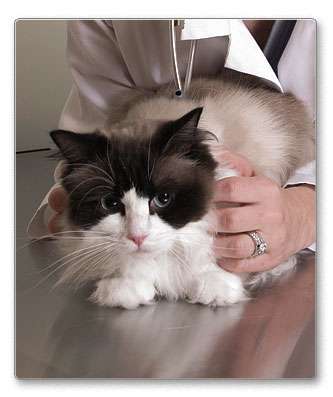
Taking a moment to learn more about the special needs of your senior pet is the first step toward providing the best care for your companion in its later years. At MVC, we place a special emphasis on senior care and are proud of the special interest we take in geriatric medicine and the care of chronic disease.
Pets that are about six years of age and older begin to go through a gradual reduction of their physical capabilities. This process can be slowed and managed through proper veterinary care that can provide your pet an extended period of vitality and good health. Preventive care tailored to your pet's age, lifestyle, risk factors and other elements can help prevent common diseases or detect them at early and easily treatable stages.
There is also an important role for you to play as your pet's primary caregiver. You can influence your pet's activity level, living conditions, access to quality senior veterinary care, and daily nutrition. With your veterinarian's help, you can manage these factors in order to prolong your pet's good health, vitality, and increase his or her wellbeing, even as his or her pace slows a bit.
The best time to begin your pet's senior care program and recognize the need for a little extra TLC is before age related conditions begin to set in. Metropolitan Veterinary Center recommends regular senior wellness exams, which should include a specialized lab work to detect the early signs of disease processes. Dental care at this point in life also becomes even more important. We recommend routine dental exams and cleanings for all pets, but especially those in their senior years. Diet and weight gain are important issues to watch out for. When you bring your pet in for a senior wellness visit, we will evaluate his or her weight and offer recommendations based on what we see.
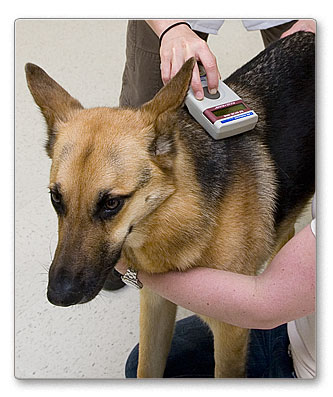 Microchipping
Microchipping
How would you find a lost pet if its tag becomes lost or unreadable, or if you happen to be traveling and your pet wanders off?
Studies have shown that more than 10 million pets get lost each year and about 90 percent would not be returned to their owner unless they have some form of permanent lost pet identification. Getting lost is the number one cause of pet death.
This is why Metropolitcan uses international microchips as a standard of care for all of our feline and canine patients. With a microchip, your pet can be identified quickly and easily by animal control officers, shelters, and veterinary hospitals. Microchips are safe, unalterable and permanent identification for pets.
We offer complimentaty registration and customer service seven days per week, 24 hours per day, and worldwide coverage since our microchips can be read by any International Organization for Standardization (ISO) compliant scanner in the world.